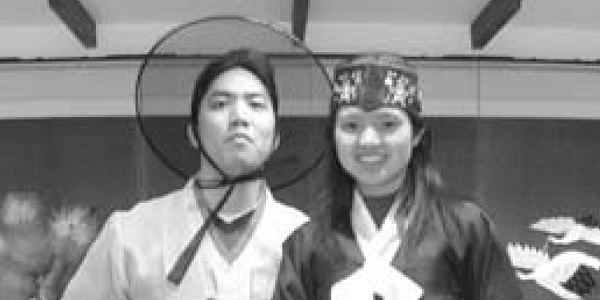Years spent in Korea

It has been nearly thirty years since I left Seoul, the capital of South Korea (now known as Seoul). After all, it was the place where I was born and grew up. Looking back on the past, I still have strong and inextricable emotions; there are both gratitude and resentment.
Sincere friendship forever
Seoul was the refuge where my parents were forced to flee their homeland due to the Japanese invasion. At that time, we were helpless, alienated from a foreign land, ostracized, attacked, without adequate legal protection, and had to compete with local residents for jobs. You can imagine how difficult the situation was.
Miraculously, my late mother quickly became a close friend with the landlady. Thanks to her, she was able to buy food. Later, she became my late mother's private bilingual teacher in Korean and Japanese. This is the lovely national character of Koreans - once they regard you as one of their own, they will treat you with the enthusiasm of "one family".
Just like another close friend of my late mother, she was an obstetrician and gynecologist, and all ten of us brothers and sisters were delivered by her. Perhaps the "doctor" has been in love for a long time and treated us as her own children. In the 1960s, my brother graduated from high school. At that time, the only way out for Korean overseas Chinese was to return to Taiwan to further his studies. My brother was no exception. However, she insisted on sending her brother to study in the United States. Because of her foresight and the help of her children who were practicing medicine in the United States, it was not just my brother who benefited. , which benefits our whole family even more. She was the benefactor that my late mother would never forget during her lifetime.
Evil people embezzle family property
However, we did not expect the fierceness of the Koreans. From the time I can remember, until the first grade of elementary school, we lived in a large house covering an area of nearly two acres; with a spacious front and back yard, and a separate rentable side room, we never felt crowded. Until now, foreigners could not own property in their name, so my late father placed the property in the name of a Korean acquaintance (as was the practice for foreigners at the time).
Unexpectedly, our property was at a loss and our conscience was gone. This acquaintance insisted that he was the owner, and his fierce nature was exposed. In this way, all our properties were wiped out overnight. We were forced to move out of the home we built with our blood and sweat, and we lived forever. The bitter years of renting a house.
Men are superior to women and respect human ethics
Because of several relocations, I had many opportunities to interact directly with Koreans since I was a child, which deepened my understanding of them. In particular, they regard "men are superior to women" as a matter of course; men deserve it and women accept it willingly. For example: The landlord is a big family with three generations living under one roof. Every meal, I see my grandmother and daughter-in-law preparing everything in the kitchen, serving the Kang, waiting for the men in the family to finish eating, and then taking the leftovers back to the kitchen. Every meal is like this, no complaints.
I once saw with my own eyes that when a wise and capable wife who helped her husband with his business during the day and took care of all the housework after work was punched and kicked by her husband, she did not dare to resist even though she was carrying a young child on her back, and the neighbors did not intervene. Whether you call this a "custom" or "accumulation does not lead to success," it is extremely unfair. I really hope that in this land, we can regain the prosperity that God created for women in the first place.
However, the Korean concept of "ordering the young and the old" is very common: always being respectful to parents, elders, bosses, brothers, and even seniors is a virtue worth admiring. Perhaps, this habit has tempered their obedience and indirectly foreshadowed their obedience to the pastor and elders in the future. Indeed, the problems that occur today in Chinese churches between co-workers and co-workers, and between co-workers and elders rarely occur in Korean churches.

▲Korean society still inherits the Eastern culture's human ethics philosophy of "men are superior to women, and the elders and younger ones are in order" (Photo by Wen Yongxun).
Love the Lord, devote yourself diligently to the Lord
I recall walking on the streets of Seoul in the 1970s and 1980s. As far as the eye could see, there were crosses hanging high in the sky, representing the church. The number was comparable to that of TV antennas. Indeed, the construction of churches meant the growth of believers. According to statistics, the growth rate of Korean Christians at that time was four times higher than the population growth rate (note). It once attracted church leaders from various Southeast Asian countries to come and observe. I have learned a lot from my childhood and have benefited a lot from it, so let me explain slowly:
I remember that a high school classmate shared with me that her church was "overcrowded" during Sunday worship and could not build a church in time. As a temporary solution, she had to put chairs around the corridor and add a few loudspeakers. Deacons report in meetings and call on brothers and sisters to donate. A member who was willing to donate went home and picked up the phone to notify the church. He was told that someone else had already donated first. In the Korean church, there is a rush to donate! They are not all rich people, but they firmly believe that "giving is more blessed than receiving" and they take action.
There is a common phenomenon seen in Korean churches: respect for preachers, which they regard as the path to blessing (see Ezekiel 44:30). It is no wonder that the first choice of 80% high school students at that time was to be a pastor. Just imagine, the church has the best pastoral talents, coupled with the love and obedience of the congregation, no wonder the Korean church is growing so fast. On the other hand, there is a sharp contrast in the Chinese church; preachers generally receive low treatment in the church. As a result, Chinese Christians who do not devote themselves to serving the Lord first consider teaching positions in seminaries, secondly in evangelical institutions, and finally in pastoral care. Raising the church is amazing!
My good friend is married to a Korean pastor. It is said that his parents’ wish before God for many years is to dedicate their first-born and best to God—to become a pastor. For this reason, when he was in high school, his family began to raise funds for his future theological education. They have a serious attitude towards God. They are not only proud to serve God, but also willing to put their best forward.
Pray urgently and pray again
Another feature of Korean churches: the emphasis on prayer. In addition to all-night prayers, morning prayers (starting at 4:30 in the morning), and fasting prayers, it is said that every church of a moderate size has its own prayer mountain, usually Small caves were carved according to the mountain topography, with enough space for one person to lie down. There is nothing inside the cave, but there is a wooden door outside. Believers stay inside and pray for several days or dozens of days.
They firmly believe that prayer is the secret to gaining power, so praying precedes preaching and is the action they take. Most preachers pray for a long time every day, and go up to the mountain to pray every week to bring the power of heaven to the earth. The revival of Korean churches is The best testimony.
As I write this, I see today’s South Korea: church revival, bold missionary work, and economic boom. It really makes me see what God has done! I am lucky enough to have spent some time in Korea.
Note:
Deng Zuoliang, "Revisiting the Chinese Church in South Korea", "Chinese Church Today", February 1980, page 35.
 Journalist profile
Journalist profile
Zhang Jili, if she hadn't known Li Li, would not have thought of writing "things". She has been pastoring in the United States and Canada for more than ten years. She has a daughter who is studying in graduate school this year. In her free time, she likes to listen to classical music with her husband.
